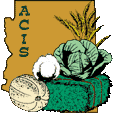
|
|
|
|

|
|||
|
|
|||
|
|
|||
We are now in the hottest part of the year in the desert southwest region of Arizona, with respective average high and low temperatures of 108 and 83°F. Lettuce disease management is probably the last thing on a Pest Control Advisor’s or grower’s mind at this time. However, this is the perfect time to perform preplant soil flooding in fields that had high levels of Sclerotinia drop this past season. How can a soil flooding treatment in the summer help manage a disease that will not be a problem for several more months in a yet to be planted lettuce crop? The two fungi that cause lettuce drop, Sclerotinia minor and Sclerotinia sclerotiorum, carry over in fields between crops of lettuce as small black structures called sclerotia. These fungal propagules function like seeds, remaining dormant until they germinate in cool moist soil and infect lettuce plants. Many sclerotia decay naturally over time; however, sufficient numbers can remain in a field after one or more years to cause lettuce drop when a planting is established. If sclerotia in a field could be destroyed, then this field would no longer be a source of the Sclerotinia lettuce drop pathogens. This is where summer preplant soil flooding comes in. Past research conducted at The University of Arizona Yuma Agricultural Center demonstrated that virtually all sclerotia of S. minor and S. sclerotiorum present in soil did not germinate after a 3-week period of flooding in the summer. This soil treatment technique has been used successfully by growers in the Yuma area to successfully manage Sclerotinia lettuce drop in fields chronically affected by this disease. |
|||
| Back | |||
|
For questions or comments on any of the topics please contact Marco Pena at the Yuma Agricultural Center.
|
|||
|
Home |
Cotton | Veggies |
Forages | Grains
| Citrus |
Crop x Crop Insects | Diseases| Weeds | Pesticides | Economics | News | Weather | Research | Photos | Contacts | General Info. Copyright © 2001 University of Arizona, College of Agriculture and Life Sciences Webmaster: Al Fournier (acis@ag.arizona.edu) |
|||
